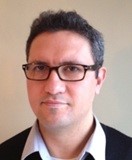
|
|
|
Tutorials
1. Introduction to high-performance computing Prof. Nouredine Melab, University of Lille- INRIA, France Abstract: On the road to the exascale era, according to Top500 modern supercomputers are increasingly large and heterogeneous including multi-core processors with various architectures, accelerators (e.g. GPU) and other low-energy resources (e.g. FPGA). Such hardware diversity is translated at the software level into a more complex programming requiring various parallelization models and programming paradigms, languages and tools. The objective of this tutorial, which is more general than metaheuristics, is to give an introduction to High Performance Computing (HPC) focusing on parallel computing. The tutorial is started with a short overview of the different families of HPC platforms. Then, are given some basics of parallel algorithm design and programming for these platforms using some standard parallel programming environments. Finally, the major performance-hampering roadblocks to exascale era are pointed out and some initiatives are sketched. Biography: Nouredine Melab is a full Professor at Université de Lille where he has received a PhD in computer science in 1997. He has been an Associate Professor at Université du Littoral - Côte d’Opale then Polytech’Lille before going back to Université de Lille. His research interests, at Inria Lille and CNRS CRIStAL labs, include combinatorial optimization and parallel (multicore, many-core, cluster, etc.) computing. He has (co-)authored more than 150 international publications on large-scale parallel and/or distributed optimization including journal and conference papers and book chapters. He has supervised 15 PhD theses on parallel optimization. He is the scientific leader of supercomputing at Université de Lille since 2005. In Education, N. Melab is the co-head of the master of advanced scientific computing at Université de Lille since 2010. He is teaching mainly operations research and parallel and distributed computing.
2. Scheduling Problems Prof. Imed Kacem, University of Lorraine - LCOMS, France Abstract: This tutorial will summarize the main characteristics of the scheduling problems and introduce the main existing approaches for solving them. The first and the main part of this talk will be devoted to the presentation of the considered problems, their properties/structures and their associated models. Moreover, we will provide an overview on approximate/exact methods and their application to scheduling problems. In the second part, we will show that the performance evaluation of some heuristics and local-search methods can be analytically done in the context of the polynomial approximation theory. As an illustration, we will show analytically some guaranteed performance ratios of approximation algorithms and schemes for solving scheduling problems under non-availability constraints. Biography: Imed KACEM is Full Professor since 2009 at the University of Lorraine, France, in Computer Science. He is the Founder and the Head of LCOMS Laboratory of the University of Lorraine since 2013 (LCOMS is the Laboratory of Design, Optimization and Modelling of Systems) after being the Head of the Computer Science Department. His scientific activity is in the Operational Research. More precisely, his contributions are related to the design of exact and approximate algorithms with a guaranteed performance for the NP-hard combinatorial problems. Such problems are mainly related to the scheduling theory. The applications are interdisciplinary and various (production, packing in electronic design, healthcare, transportation, information visualization…). His contributions have been published in referred journals (Theoretical Computer Science, Discrete Applied Mathematics, Discrete Optimization, Journal of Combinatorial Optimization, Journal of Scheduling, JIMO, IJPE, JIM, EJOR, IJOR, 4OR, CAIE, IJCIM, IEEE/SMC Transactions, CAOR,...). These research activities have involved the supervision of 14 PhD theses as well as several selective projects (some of them have been funded by the ANR, the European Commission, the CNRS, …). He serves as area editor or guest editor for several journals (Annals of Operations Research-Springer, Computers & Industrial Engineering-Elsevier, RAIRO-Operations Research, European Journal of Industrial Engineering, Journal of Systems Science and Systems Engineering-Springer, AutoSoft Journal-Taylor & Francis…) and as Keynote Speaker for several conferences (IEEE/CIE40, Japon (2010); FUBUTEC2011, United Kingdom (2011); IEEE/CoDIT2013, Tunisia (2013); IEEE/ICSCS2013, France (2013); DASA2016, Tunisia (2016); CIE46, China (2016), AMATH'16, Switzerland (2016); IEEE/CoDIT2017, Spain (2017)). He chaired the program committee or the organizing committee of several international conferences (IEEE/ICSSSM06 (Troyes, 2006); IEEE/CIE’39 (Troyes, 2009); IEEE/CoDIT’14 (Metz, 2014); CIE’45 (Metz, 2015); IEEE/CoDIT’16 (Malta, 2016); ROADEF2017 (Metz, 2017); MOPGP2017 (Metz, 2017)). He obtained the « Great Award of Research 2010 » from the Universities of Lorraine, the 3rd Robert Faure Award 2009 from the French Society of Operational Research and Aid Decision (ROADEF), the 2015 Steffan Schwarz Award (Best Paper Award of the European Conference ECEC’2015 in Portugal), and he has regularly the PEDR or the PES Premium (with the highest level A) since 2006.
|



